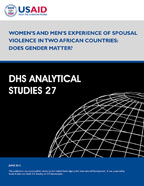- PUBLICATIONS
- JOURNAL ARTICLES
- ACCESS PUBLICATIONS
Publications Summary
- Document Type
- Analytical Studies
- Publication Topic(s)
- Domestic Violence, Gender
- Country(s)
- Ghana, Uganda
- Language
- English
- Recommended Citation
- Kishor, Sunita and Sarah E.K. Bradley. 2012. Women’s and Men’s Experience of Spousal Violence in Two African Countries: Does Gender Matter? DHS Analytical Studies No. 27. Calverton, Maryland, USA: ICF International.
- Download Citation
- RIS format / Text format / Endnote format
- Publication Date
- June 2012
- Publication ID
- AS27
Download
 Women's and Men's Experience of Spousal Violence in Two African Countries: Does Gender Matter? (PDF, 593K)
Women's and Men's Experience of Spousal Violence in Two African Countries: Does Gender Matter? (PDF, 593K)
